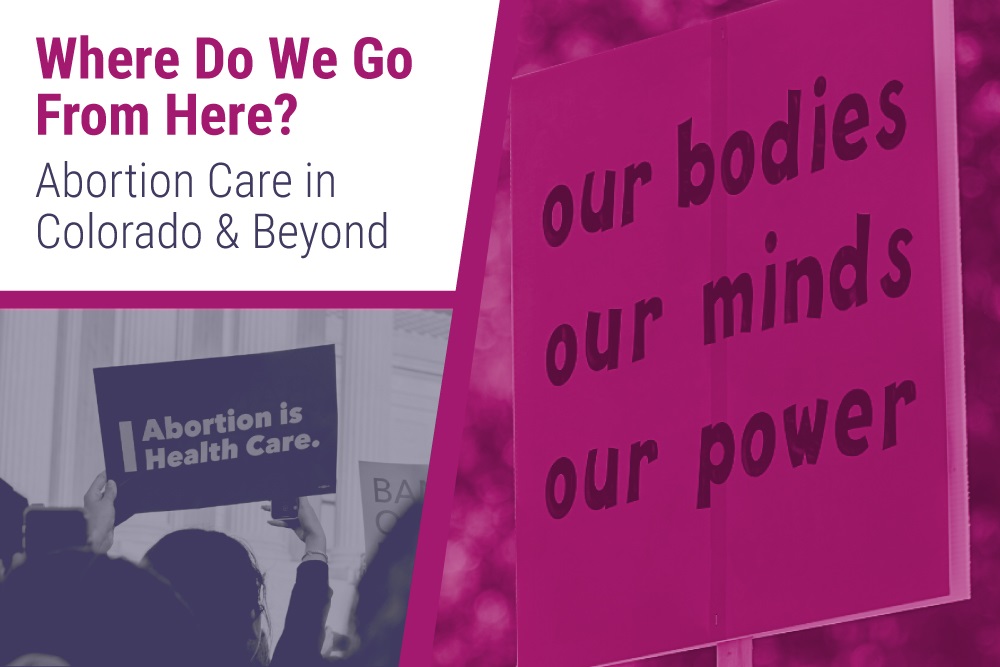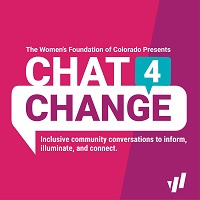
Where Do We Go From Here? Abortion Care in Colorado & Beyond
We Commit to Working With You & Reproductive Justice Leaders to Ensure Abortion Is Legal, Accessible, and Destigmatized
We are outraged and heartbroken. Since The Women’s Foundation of Colorado’s founding in 1987, women across the country have been protected in their decision to continue or end a pregnancy through the Supreme Court’s 1973 ruling in Roe v. Wade. Even though we knew that that the Supreme Court’s ruling on Dobbs v Jackson Women’s Health Organization would likely overturn the precedent set in Roe v. Wade, it is surreal that this is our country’s new healthcare reality for those who become pregnant.
While abortion care in Colorado will remain protected because of the Reproductive Health Equity Act, access will be denied or severely limited to women in the majority of states. We can’t begin to estimate the impact to gender, racial, and economic equity in a country where having access to the full range of reproductive information, care, and justice is the exception, not the rule.
If you are a donor or individual who wants to increase access to the full array of reproductive health information and services, including abortion care, we offer these resources and encourage you to share them widely with the people in your life.
As the only community foundation in the state focused on the advancement of women and their families, The Women’s Foundation of Colorado is committed to working with you and reproductive justice leaders to ensure that abortion isn’t just legal – it’s affordable, accessible, and destigmatized in Colorado. We will continue to use our trusted voice, knowledge, network, and resources to support the right to decide to have or not have children, free from stigma.
Upcoming events
 Join The Women’s Foundation of Colorado and ReproCollab virtually on July 19, 2022, for our next Chat4Change, Where Do We Go From Here? Using Your Time, Talent, Treasure, and Testimony to Protect and Increase Access to Abortion Care.
Join The Women’s Foundation of Colorado and ReproCollab virtually on July 19, 2022, for our next Chat4Change, Where Do We Go From Here? Using Your Time, Talent, Treasure, and Testimony to Protect and Increase Access to Abortion Care.
We will be joined by Colorado reproductive justice leaders Karen Middleton, president of Cobalt, and Mykaela Aguilar, deputy director of Colorado Organization for Latina Opportunity & Reproductive Rights (COLOR).
This community conversation will delve into the impact of the SCOTUS ruling on abortion services in Colorado, as well as the reproductive justice movement and meaningful advocacy and donor opportunities. Additionally, there will be five breakout rooms to continue the conversation with others.
Abortion funds
Whether it’s funding procedures, abortion pills, transportation and lodging when travel is required, childcare, doula and emotional support, or other needs voiced by people seeking abortions, abortion funds find ways to get people the abortions they want and need.
Abortion care providers
Independent abortion care providers are where three out of five patients in the United States go for abortion care. See this list to find independent providers for abortion care in Colorado and other states.
Additionally, the Colorado Doula Project has an Abortion Support Network that can help you find a clinic and support for an abortion.
Planned Parenthood of the Rocky Mountains includes Colorado, New Mexico, Southern Nevada, and Wyoming. It delivers reproductive and sexual health care; teaching medically accurate, age-appropriate sexuality education; and working to protect the right to access safe, legal abortion. Each year, nearly 100,000 people visit PPRM’s 23 health centers. PPRM supports patients who do not have insurance or cannot afford an abortion through their Patient Assistance Fund.
Comprehensive Women’s Health Center at CU Anschutz – full-service abortion and contraception practice with all board-certified and fellowship-trained physicians.
Advocacy organizations
Cobalt – Colorado nonprofit dedicated to abortion access and reproductive rights.
Colorado Organization for Latina Opportunity and Reproductive Rights (COLOR)* – A community-rooted nonprofit organization that works to enable Latinx individuals and their families to lead safe, healthy, self-determined lives.
Elephant Circle – Colorado nonprofit bringing an intersectional, feminist, reproductive justice, design-thinking approach to birth justice.
Planned Parenthood of the Rocky Mountains – Regional Planned Parenthood affiliate working to protect the right to access safe, legal abortions.
ReproCollab – A partnership of Caring for Colorado Foundation and The Colorado Health Foundation advancing the movement for sexual and reproductive equity across Colorado.
Soul 2 Soul Sisters* – Denver-based nonprofit that honors and supports Black Girls and Black Women wherever they are in the broad spectrum of their reproductive journey i.e. healthy body-image, healthy partnered relationships, correct use of contraceptives, deciding when to have a baby, support with breastfeeding, navigating postpartum, deciding whether to have an abortion – Soul 2 Soul Sisters upholds abortion as a sacred, holy decision among Self, Divine, Universe, Ancestors and Chosen Beloveds #MyBody #MySacredDecision – or healing from a miscarriage.
The Brazen Project – Launched by New Era Colorado, The Brazen Project fights to shift the culture on Colorado campuses to end abortion stigma. Unapologetically pro-abortion access, the organization is active on Auraria campus, Colorado State University, and University of Colorado Boulder.
Actions you can take now to support access to abortion care in Colorado and beyond
The Time Is Now: From the Women’s Funding Network, if you’re looking for ways to increase or deepen your investment in the fight to protect abortion access and bodily autonomy, here are five immediate actions that you and philanthropy at large can take.
Further reading
The Women’s Foundation of Colorado’s reproductive health statement
The Limits of Privilege: From The Cut, a look at how the new abortion regime affects everyone.
Turnaway study: Research conducted from 2008-2010 found serious consequences of being denied a wanted abortion on women’s health and wellbeing. Women denied a wanted abortion who have to carry an unwanted pregnancy to term have four times greater odds of living below the Federal Poverty Level (FPL).
Guttmacher Institute: A leading research and policy organization committed to advancing sexual and reproductive health and rights worldwide.
Abortion Restrictions Are Racist: Women of color will bear the brunt of further restrictions and banned abortions, according to statistics analyzed by The Associated Press.
The 19th: What Abortion Looks Like In Every State Right Now
Killing the Black Body: A rallying cry for education, awareness, and action on extending reproductive justice to all women. It is as crucial as ever, even two decades after its original publication.
*Women and Girls of Color Fund grantee

